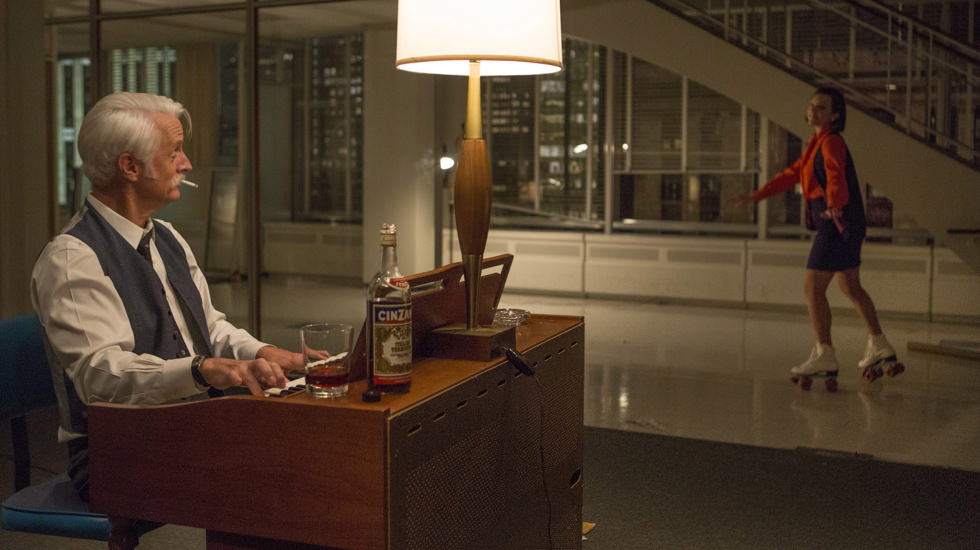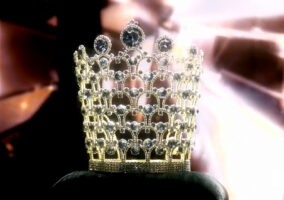 John Slattery and Elisabeth Moss in “Mad Men” on AMC
John Slattery and Elisabeth Moss in “Mad Men” on AMC
As the walls of Sterling Cooper literally start coming down around them, Roger is clinging to the past, Peggy is looking eagerly toward the future, Joan cashes out and Don hits the hobo trail with another man’s name in his pocket. The more things change, the more they stay the same.
It seems we’ve all spent so much time obsessing over how Matthew Weiner was going to end Mad Men that we didn’t notice he was already doing it, right in front of our eyes. With only two more episodes to go, could the show possibly give us imagery more final and heart-wrenching than lingering over the corpse of the bombed-out SC&P offices? Could it possibly give us a moment more sublime than Peggy roller-skating through the wreckage while Roger plays a drunken “Hi-Lili, Hi-Lo” on the organ? Could it give us a moment more triumphant than badass, hungover, tentacle-porn-and-sunglass-toting Peggy sauntering down the cramped, sunless halls of McCann Erickson on her first day, ready to kick ass, take names, put in her three years and quadruple her salary? Could it give us a more final image of Dick Whitman than the man heading west (eternally heading west) with a hitchhiker in tow and nowhere else he’d rather be? Of course we want to suck up every last remaining second we possibly can have with any of these characters and don’t want any of it to end, but we keep getting moments that feel like final good-byes. Or put more accurately, we keep getting moments that feel like the culminations of these characters’ arcs; a series of “of course this is where they would wind up” grace notes before the song is finished.
As an aside, we don’t think we’ve ever encountered a show winding down to its finale in quite this manner. We’re all on tenterhooks, wondering “Is this the last Megan scene?” The last Harry scene? The last Don & Betty scene? We said goodbye to Ed and Shirley – and even Lou Avery – but will we see Dawn or Caroline again? In a way, it’s excruciating, but it’s so of a piece with the show’s style. In life, we rarely give Grand Goodbyes to people that we know we’re never going to see again. If the final episodes were a series of on-the-nose capstones for each character, it would feel a little off-model to us. If anything, with this episode, we’re a bit surprised with how final it all feels. We assumed the show would end in a vague and unfinished manner, Sopranos-style. Again, though: we have to remind ourselves there’s two more episodes left. But we can’t help remembering how often Weiner made the finale of each season feel like it happened several episodes before the season ended.
Anyway, let’s consider Peggy and Joan in this episode, and the very different ways in which they approach McCann and in which McCann approaches them. Women copywriters are sniffing around Joan’s desk, trying to get the crumbs that Peggy will leave behind, making it clear that Peggy has quite a reputation and standing among this crowd. Peggy’s spent ten years honing her skills, working late hours and weekends, and putting up with a ton of crap along the way. Joan, unfortunately, has virtually no reputation and no standing whatsoever. She has very limited account experience and a former partnership stake so small and insignificant that it buys her no protection or offers her any sort of leverage in any of her dealings. You’ll note that no women account executives appeared at Joan’s door. She may be a rarer creature at McCann than Peggy is. Peggy has the benefit of working in a creative position, which tends to attract more open-minded people. Joan’s working alongside men who have whorehouses and escort service numbers in their business rolodexes because that’s a standard way of wooing clients.
Additionally, the sexism both women face takes different forms. Peggy has spent the last ten years being dismissed as “just a girl” while Joan is constantly fending off attention for having the body of a pinup. While Peggy has grown stronger over time by learning how to deflect or ignore men who dismiss her, Joan seems to have grown weary over all the rampant sexual harassment she faces constantly. What’s most interesting about Joan’s reaction to the sexism of her colleagues is how fiercely she came out swinging against it. Maybe “weary” isn’t the word we should’ve used to describe her at this point. “Fed up” is more like it. And in the most shocking development of all, Joan Harris, of all people, started spewing feminist rhetoric at Jim Hobart like a champ, threatening not only to lawyer up with the EEOC and ACLU, but by name-checking Betty Friedan and threatening to recreate the recent march down 5th Avenue in Jim Hobart’s reception area. It was a glorious thing to behold, coming from a character we’d never expected to hear say such things. But Joan’s consciousness has been raised and she’s sick and tired of the men around her. Unfortunately for her, it all means very little in the end. We’re happy to see her stand up for herself, but she had no real power to do anything in a giant factory like McCann.
There’s something about Joan’s arc that has always disturbed us just a little bit, but it’s hard not to see this ending as a perfect capper to it. Namely, all her major developments as a character have been based around sex: she had a decade-long affair with a married man, got raped, got pregnant after having sex in the street with her former lover while married to another man, prostituted herself to advance her career and now she’s walking out the door with less cash than she’s owed and no career to speak of because she didn’t want to have to sleep her way through her new job. It’s another of those “of course” moments – especially when you consider she’s walking out the door and into the arms of a wealthy man who adores her. This is not to say Joan isn’t crushed or that this is necessarily the happy ending she wants or deserves, but it’s all very thematically appropriate for her character, which tends to make it all the sadder somehow. Of course Joan would be turned into a sex object and devalued. Of course.
We suppose we should worry about Peggy’s fate at McCann, considering Joan didn’t last more than three days at the place, but when you look at the entire arc of Peggy and Joan’s journeys, it’s about how one woman had all the tools she thought she needed to navigate the world and get what she wanted out of it and another woman who didn’t think she had those tools at her disposal so she forged her own and went her own way. The latter was in prime position to benefit from a decade of social upheaval like the sixties. The other one built her life expectations on sands she didn’t realize were going to shift under her feet. And besides, Peggy got the absolute best bit of advice she may have ever gotten from, of all people, Roger Sterling, who shoved a tentacle porn print into her hands and scoffed at the idea that she’s supposed to make the men around her more comfortable. He essentially gave her permission to go rock their worlds at McCann and damn the fallout. Unlike Joan, she’s got the standing to make that attitude work for her.
As for the rest of Our Gang, of course Roger is maudlin, holding onto the past and completely unable to help Joan in any meaningful way. Of course Betty is finding fulfillment by going back to school after all this time. Of course Harry’s thrilled at joining “mission control.” Of course Pete’s a glad-handing Vice-President among dozens and Ted’s a happy little boxed-lunch cog.
Of course Don hit the hobo trail.
When Don stood up and walked out of that utterly stultifying Miller Beer meeting, it was one of the few times we cheered his hobo nature and irresponsible ways. He may be a mess and a hard character to like in a lot of ways, but even after all this time, we don’t want to see the man consigned to hell. Punished, maybe. But not even Don Draper deserves a fate like McCann, which has been considered a hellish place worthy of the most desperate actions in order to avoid it since the earliest days of this story. And we can chalk up the realization that everything the characters feared about the place turning out be true to another of those “of course” moments these final episodes keep giving us. Of course Jim Hobart is Captain Ahab and Don his Moby Dick. Of course Don would run as fast and as far away from that sausage factory as he possibly can. The only real mystery was why he ever thought he could make it work in the first place. Then again, we can’t tell if Don left because the place is so factory-like or if he left because Jim Hobart clearly lied about buying out an agency just to give him a beer account and gives the same pep talk speech to every creative director that he gave to Don. Did Don leave because McCann isn’t a special enough place for his talents or did he leave because it’s a place that doesn’t think Don Draper is all that special? We’d argue it’s a little of both. Don never did like sitting through meetings, but that research guy’s “Let me describe a specific man” speech represented an approach to advertising that Don has always found revolting; a business-like and highly clinical approach that reduces people to consumers, lives to a series of behavioral tics and preferences. Don still wants advertising to have a soul and a place like McCann eats souls for lunch. In little white boxes.
We could take a Don Draper ending that had him bankrupt or unemployed and we might even accept one that had him in jail or even dead. But to see a Don Draper turned into another white-shirted, pen-holding creative director in a room full of them; to see him stripped of every single aspect of his power and every chance to be creative in the future, to see all his uniqueness reduced to another cog in a huge machine – that’s not a fate we want to see for this character. So run, Don. Your wife is gone, your lover has disappeared, your company is dead, your kids don’t need you, your ex-wife is happy and fulfilled in a way that seemed impossible when she was with you, and you literally have no home. Oh, and you’re richer than you’ve ever imagined you could be. Run, Dick Whitman. Run. Go find that Lost Horizon.
Oh, we are going to have SO much more to say on Wednesday with our Mad Style post.
You can hear our interview with Don Draper’s secretary Meredith, aka actress Stephanie Drake here.
For more discussion on your favorite shows, check out our TV & Film forum.
[Photo Credit: AMC]
Pop Style Opinionfest Podcast: Mad Men’s Stephanie Drake, RuPaul’s Drag Race and Broadway Street Style Next Post:
Met Gala 2015: Rihanna in Guo Pei Couture
Please review our Community Guidelines before posting a comment. Thank you!



